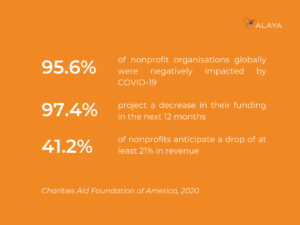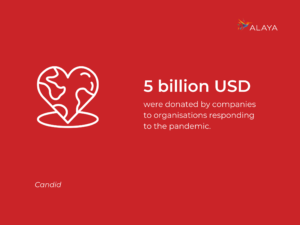These are testing times for many. Since the beginning of the coronavirus pandemic, nonprofit organisations are confronted with the depletion of their funding and increased demand for their services. This is creating a lot of uncertainty about the future, and many nonprofits are now facing a test for their survival. According to a FastCompany article, nearly 40% of nonprofits may be forced to close because of the pandemic. The nature of the crisis is shining a light on the important role that corporate social responsibility (CSR) programs can play to help communities and nonprofit organisations create a positive impact for those in need.
How have nonprofits been impacted by COVID-19?
An increase in financial pressure for nonprofits worldwide
The current sanitary and economic crisis has been putting pressure on nonprofit organisations all around the world. An international study by the Charities Aid Foundation of America found that 96.5% of nonprofit organizations globally reported being negatively impacted by COVID-19, based on a survey of nearly 530 nonprofits in 93 countries.
In the same study, 97.4% project a decrease in their funding in the next 12 months, with 41.2% of nonprofits anticipating a drop of at least 21% in revenue.

As an example, the nonprofit Oxfam recently announced it was closing down 18 offices, about a third of their global workforce. One of the main reasons for these measures is the drastic drop in revenue since the closure of their high-street shops in March. And the number of people who rely on the nonprofit’s work is daunting: 19.5 million worldwide.
Other major fundraising events have been postponed or canceled, such as The London Marathon, which had raised 66.4 million GBP (80 million CHF) for UK charities in 2019.
A rise in demand to support local communities under strain
At the same time, many nonprofit organisations have seen demand for their services increase since the beginning of the crisis. The coronavirus is creating social challenges for people who have lost their revenue streams and turn to local nonprofits for help.
In Switzerland, food banks have seen a sharp increase in the amount of food distributed, such as the Centrale Alimentaire Région Lausannoise (CA-RL), which reported a 20% rise of distributed food in April, representing 11 tons of additional goods. In fact, it appears that those needs are still growing, as CA-RL’s data shows a 50% increase as of mid-May, with 7’500 beneficiaries instead of 5’000 before the crisis.
The struggle to balance demand and support
Nonprofits are on the frontline in the fight against the pandemic. In Spain, the Red Cross launched the largest mobilization of financial and human resources in the nonprofit’s history in response to Covid-19. During the first month, the Red Cross attained 600’000 interventions, directly aiding a total of 1.35 million people. Thanks to approximately 31’200 volunteers, they have attended to approximately 720’000 who are most vulnerable to Covid-19, delivering basic services such as food, hygiene, healthcare and an allowance to cover basic amenities for about 25’000 families, as well as providing psychological telephone assistance to approximately 200’000 people who suffer from loneliness. These organisations cannot afford to see their finances at risk in such a crucial moment.
Nonprofits need support now more than ever.
How can companies respond?
As the coronavirus pandemic impacts millions of lives, corporate philanthropy is providing some significant help to address some of the challenges and devastation left in its wake.
Responses have ranged from:
- Monetary donations
- Adapting supply chains to produce essential materials
- Corporate volunteering initiatives
Although these actions bring immediate relief, there needs to be a lot more over the next months, and probably even years.
As mentioned earlier, financial insecurity is pushing many nonprofit organisations towards their end. In this time of crisis, individuals may not be able to give as much as before, but corporate giving can step up, and it has already started. According to Candid, a group that tracks global philanthropy, about 5 billion USD (5.75 billion CHF) were donated by companies to organisations responding to the pandemic.

But this is still far from filling the gaps. Revenue streams will still be hampered by the coronavirus for a while. Corporate giving could be a big support to ensure nonprofits can deliver crucial services.
Virtual volunteering: The new method to help
In addition to their production and economic support, some companies have mobilized what is surely their greatest asset: people. Corporate volunteers – employees who participate in social activities promoted by the company – provided their help amidst the necessary measures of social confinement.
In Spain, 6 companies mobilised 1’000 online volunteers. They joined a social initiative to fight the loneliness of elderly people in homes and isolated due to the coronavirus crisis. This project seeks to generate virtual friendships between volunteers and older people.
Find new ways to support – don’t sit in silence
The crisis created by the coronavirus pandemic is causing a lot of distress in the world of nonprofit organisations, and ultimately on their beneficiaries. What’s even more concerning is that this is the moment the world needs nonprofits the most during a global pandemic, as many offer essential services to a growing number of people in vulnerable situations.
There has been a wave of corporate philanthropy to help mitigate the impact of the sanitary and economic crisis on nonprofits. Some ways that companies can help:
- Encourage donations from employees and offer to match them to show company support.
- Give your employees the choice to donate to causes close to their hearts.
- If funds are not available – encourage your employees to give time with paid-time off for volunteering. Virtual volunteering can offer new ways to support nonprofits.
The effects of this crisis will be present for a while, and nonprofits, as well as citizens around the world, will expect corporations to step up to the challenges of their communities.
If you are a company and need support in a platform that enables these types of actions – get in touch with us and we can see how we can support.
If you are a nonprofit and would like to be connected on our platform to access a network of over 86,000 changemakers across the globe – get in touch here.
Go back to blog >